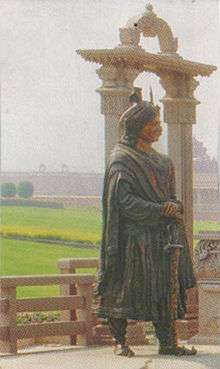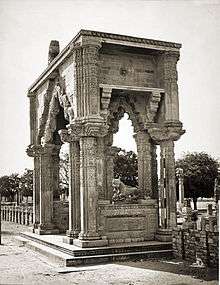Mihira Bhoja
| Mihira Bhoja | |
|---|---|
 Statue of Mihir Bhoja in Delhi | |
| 6th Gurjara-Pratihara king | |
| Reign | c. 836 – c. 885 CE |
| Predecessor | Ramabhadra |
| Successor | Mahendrapala I |
| Died |
885 Narmada River |
| Father | Ramabhadra (father) |
| Religion | Hinduism |
Mihira Bhoja (836–885 CE) or Bhoja I was a ruler of the Gurjara Pratihara dynasty of India. He succeeded his father Ramabhadra. Bhoja was a devotee of Vishnu and adopted the title of Adivaraha which is inscribed on some of his coins.[1] One of the outstanding political figures of India in ninth century, he ranks with Dhruva Dharavarsha and Dharmapala as a great general and empire builder.[2]
At its height, Bhoja's empire extended to Narmada River in the South, Sutlej River in the northwest, and up to Bengal in the east. It extended over a large area from the foot of the Himalayas up to the river Narmada and included the present district of Etawah in Uttar Pradesh.[3][4]
Reign

When Mihira Bhoja started his career reverses and defeats suffered by his father Ramabhadra had considerably lowered the prestige of the Royal Gurjara Pratihara family. He invaded the Pala Empire of Bengal, but was defeated by Devapala.[5] He then launched a campaign to conquer the territories to the south of his empire and was successful. After Devapala's death, Bhoja defeated the Pala King Narayanapala and the Rashtrakuta ruler Krishna II.[6]:20–21 He gradually rebuilt the empire by conquest of territories in Rajasthan, Gujarat and Madhya Pradesh. The Chandelas of Bundelkhand acknowledged his suzerainty.[5] Besides being a conqueror, Bhoja was a great diplomat.[7] During his reign, the capital was in Kannauj (present-day Uttar Pradesh), during his period Kannauj was referred as Panchala.

He was a bitter enemy of the Arab invasions[5] who, according to an Arab chronicler, Sulaiman, maintained a large army and had a fine cavalry.[8] The territories under his rule were prosperous and safe from robbers. His state was rich in natural resources, especially gold and silver mines.
Many temples made by him still survive. Teli Mandir, near Gwalior, Madhya Pradesh, marks the presence of Vishnu on earth. The temple's architecture, design and layout features an outstanding fusion of architectural styles: the roof resembles a Dravidian style while the decoration highlights the art of North India.
He was succeeded by his son Mahenderpal 1 (c.836 - 910 CE).
Coins of Mihira Bhoja
Mihira Bhoja's epithet was Srimad-Adivaraha (the fortunate primeval boar incarnation of Vishnu) and therefore there is a broad agreement amongst the scholars on the attribution of adivaraha dramma billon coins to him. These coins have a depiction of Adivaraha on the obverse.[9]
Notes
- ↑ Satish Chandra, National Council of Educational Research and Training (India) (1978). Medieval India: a textbook for classes XI-XII, Part 1. National Council of Educational Research and Training. p. 9.
- ↑ Radhey Shyam Chaurasia (2002). History of Ancient India: Earliest Times to 1000 A. D. Atlantic Publishers & Distributors. p. 207. ISBN 81-269-0027-X,ISBN 978-81-269-0027-5.
He was undoubtedly one of the outstanding political figures of India in ninth century and ranks with Dhruva and Dharmapala as a great general and empire builder.
- ↑ E-gazeteer-History of Etawah district
- ↑ Digital South Asia Library
- 1 2 3 Radhey Shyam Chaurasia (2002). History of Ancient India: Earliest Times to 1000 A. D. Atlantic Publishers & Distributors. p. 207. ISBN 978-81-269-0027-5.
- ↑ Sen, S.N., 2013, A Textbook of Medieval Indian History, Delhi: Primus Books, ISBN 9789380607344
- ↑ Radhey Shyam Chaurasia (2002). History of Ancient India: Earliest Times to 1000 A. D. Atlantic Publishers & Distributors. p. 207. ISBN 81-269-0027-X,ISBN 978-81-269-0027-5.
Besides being a conqueor, Bhoja was a great diplomat...
- ↑ Radhey Shyam Chaurasia (2002). History of Ancient India: Earliest Times to 1000 A. D. Atlantic Publishers & Distributors. p. 207. ISBN 81-269-0027-X,ISBN 978-81-269-0027-5.
The king of Gurjars maintain numerous faces and no other Indian prince has so fine a cavalry.
- ↑ Deyell 1999, pp. 28–29
References
- Deyell, John S. (1999), Living without Silver, Oxford University Press, New Delhi, ISBN 0-19-564983-4
| Preceded by Ramabhadra (833–836) |
Gurjara Pratihara Emperor 836–885 CE |
Succeeded by Mahendrapala I |